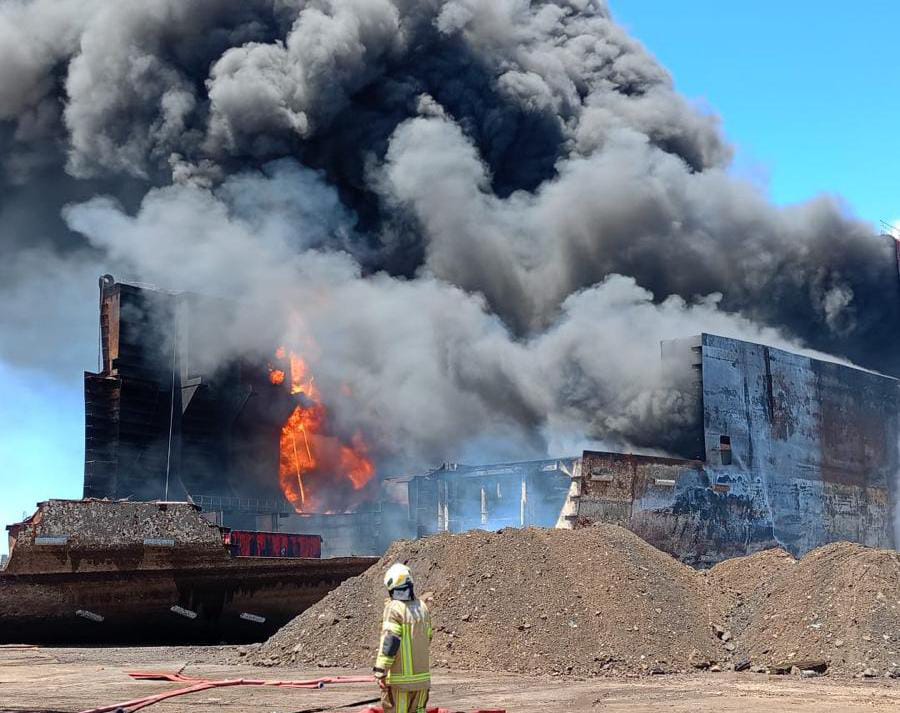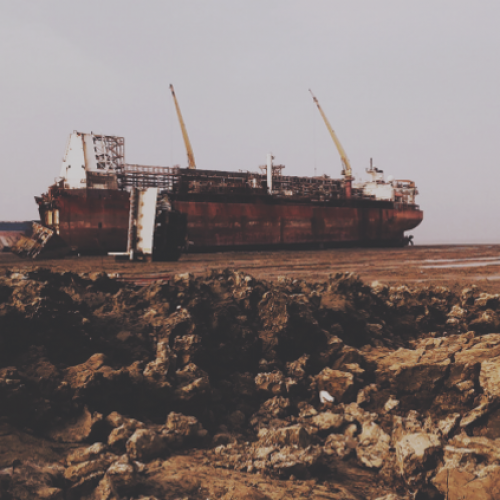Press Release: Need for reform of ship recycling sector in Turkey has never been more apparent after massive fire and waste dumping scandal revealed
In recent months, Turkey’s ship recycling sector has experienced significant movements. From controversies surrounding the sale of shipbreaking yards to the arrival of a UK Navy vessel, and now the fire aboard the decommissioned FSO Sloug, public concern has been mounting over safety, transparency, and environmental standards in Aliağa.
Moreover, on 16 June 2024, a coalition of civil society organisations filed a criminal complaint against public authorities and ship recycling companies, which exposed years of environmental monitoring and health data, drawing from recent EU inspection reports and official Turkish documents. It alleges widespread regulatory failure and systemic misconduct across the shipbreaking sector in Aliağa, including crimes of deliberate environmental pollution, document falsification, and misconduct.
Fire on the SLOUG
On July 3rd, a fire erupted on the decommissioned FSO SLOUG, which had been left idle at the Simsekler yard in Aliağa for over two years with approximately 6,000 tons of petroleum still in its tanks. The ignition was triggered during cutting operations by the presence of residual petroleum—an entirely preventable accident had the vessel been properly cleaned and certified gas-free, following both Turkish and international law.
Another Military Vessel in Aliağa
The Chambers of Chemical and Environmental Engineers have raised alarms over safety and environmental risks in Aliağa as another toxic warship arrives in Turkey to be dismantled at the yard Leyal. The HMS Bristol, a 1967 British Navy destroyer, carries hundreds of asbestos parts, lead-based paint, organotin antifouling coatings, CFC gases, and PCB-containing equipment. Its Inventory of Hazardous Materials lists over 400 asbestos items, 283 kg of lead paint, and 263.5 kg of toxic tributyltin (TBT), a banned compound harmful to marine life.
A recent BBC report revealed that two workers at Leyal — which dismantles most of the UK Navy’s decommissioned vessels — were diagnosed with occupational diseases, heightening concerns about toxic exposure and the lack of adequate worker protections.
Criminal Complaint Demands Scrutiny in Aliağa
Amid growing public concern, a formal criminal complaint was submitted on 16 June 2025 by EGEÇEP (Aegean Environmental and Cultural Platform Association), İzmir Medical Chamber, DGD-SEN (Union of Dock, Shipyard, and Shipbreaking Workers), İzmir Chamber of Chemical Engineers, and İzmir Living Spaces Initiative. It documents years of violations in Aliağa’s shipbreaking zone, citing EU inspections and Turkish government reports.
It alleges environmental crimes including deliberate pollution, falsification of official documents, and abuse of public office. Key failures include lack of environmental reviews, unsafe dismantling, poor waste management, false reporting, and ongoing neglect of worker safety and public health. These recurring violations have caused what the complainants call “slow violence” against communities and nature.
Sale of the Aliağa Ship Recycling Zone
Last month, the disputed ownership of Aliağa Ship Recycling Zone reached a critical point. The 20-year rental agreement with TOKİ (Housing Development Administration of Turkey), expiring mid-2026, is sparking debate among public, political, and industry sectors. Ongoing disagreements and failed sales attempts have stalled decisions on the land’s future. On 28 February 2025, it was revealed that Aliağa Municipality acquired the property from a TOKİ-linked subsidiary.
The land was sold for 10.06 billion TL (€ 221.3 million) excluding VAT, with claims surfacing that it will later be resold to ship recycling companies with a 32% profit margin. It was stated that 80% of the acquisition process has been finalised, with full completion expected during summer 2025.
Mayor Serkan Acar clarified that APAŞ, the municipality’s petroleum subsidiary, is a private company, so municipal council votes are irrelevant to the land acquisition. He reiterated the municipality’s aim to regulate the area, suggesting a future where the zone evolves from dismantling to include maintenance and large-scale repair operations. According to the Mayor, “the most important issue—property ownership—has now been resolved. A sale is not currently on the table. Those who have long operated in this area will be prioritised in any future decisions.”
However, the acquisition sparked debate over its opaque process, funding, future land use, and why the land was sold to APAŞ instead of the municipality directly. Critics raised concerns about transparency and lack of public or parliamentary disclosure. Mayor Acar justified the acquisition by stating that when an open tender was previously considered, the facilities had expressed fear of land loss. He shared that the companies themselves requested the Municipality’s intervention to resolve the issue.
Separately, inspections found 15,000 tons of hazardous waste improperly stored or buried in the zone. The municipality vowed strict sanctions, due to health and environmental risks. Mayor Acar acknowledged the findings and that it seemed some of the waste had been intentionally buried. Meanwhile, a group of ship recyclers protested fines, foreclosures, and demolition orders from the Municipality, demanding immediate ownership titles and criticizing APAŞ and Aliağa Municipality for arbitrary treatment. However, reports now suggest the disputes are being resolved, with an agreement reached for transferring the land to the yards.
Yet, despite now owning the land, the Municipality does not have more rights on environmental oversight, and environmental degradation in Aliağa lies in the absence of effective implementations of the regulation and oversight by the Ministry of Environment and Ministry of Transport authorities. The waste dumping could have been detected much earlier had there been proper environmental monitoring. Indeed, problems in Aliağa stem not from infrastructural shortcomings alone, but from inadequate environmental governance, including proper monitoring, regulation, and accountability, regardless of property transfer.
Upgrading Ship Recycling Practices in Aliağa
The recent fire aboard the Sloug tanker has brought renewed attention to the urgent need for strengthening oversight and regulatory standards in Turkey’s ship recycling sector. In this context, the planned dismantling of HMS Bristol, a former UK Navy vessel containing significant amounts of asbestos, PCBs, and other hazardous substances, raises serious concerns.
Given the recurring challenges documented in Aliağa—including criminal complaints —the import and dismantling of such high-risk vessels must be approached with utmost caution and responsibility. In accordance with the Basel Convention and principles of environmental justice, the UK should be urged to reassess the transfer of HMS Bristol and ensure it is handled in a facility with verified capacity to manage its hazardous contents safely and transparently.
As highlighted in our report on the shipbreaking sector in Aliaga, what is urgently needed is a comprehensive framework for ship recycling that includes robust permitting, effective monitoring, and strict enforcement mechanisms. At the same time, the sector must begin a structured transition away from the landing method toward safer and more sustainable dry-dock practices.


Related news

Maersk’s toxic trade: the North Sea Producer case
In August 2016 the FPSO NORTH SEA PRODUCER was beached in Chittagong, Bangladesh. The ship was allowed to leave the UK based on false claims that it… Read More

Press Release – Toxic warship “Clemenceau II” starts voyage from Brazil to the Mediterranean Sea
Reports from Rio de Janeiro confirm that the sister ship of the infamous aircraft carrier Clemenceau has now been placed under tow on an about 6000-mile journey to Turkey, where it is to be scrapped.
... Read More
Press Release – Brazil set to violate three international environmental treaties in sinking PCB-laden aircraft carrier in the Atlantic
Environmentalists denounce Brazilian Navy for ‘criminal negligence’.
... Read More
Press Release – One year later and no lessons learned at gadani as Aces is set aflame – again!
Shipbreaking plot no. 54 in Gadani, Pakistan, was sealed off yesterday after a massive fire broke out on-board the ship ACES (IMO 8021830). This is the same… Read More

Press Release – NGOs join local residents and First Nations in fight against toxic shipbreaking in British Columbia
NGO Shipbreaking Platform calls on authorities to halt shipbreaking activities at Union Bay.
... Read More
Press Release – Ship owner and two directors fined by Dutch Court for breaching EU waste law
Dutch company Jumbo and two of its directors fined for their involvement in the illegal export of an end-of-life ship to Turkey for recycling.
... Read More

